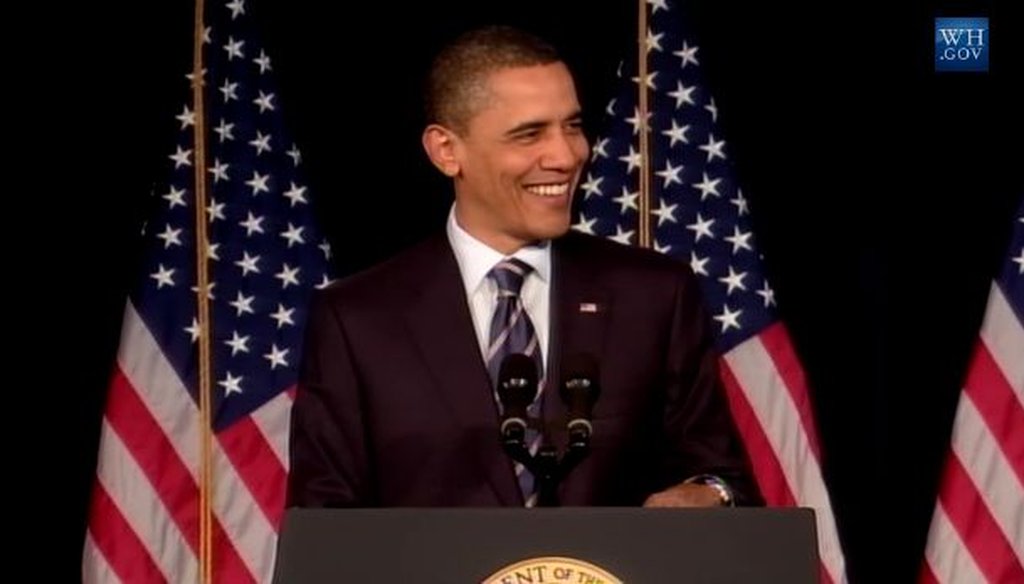

Our only agenda is to publish the truth so you can be an informed participant in democracy.
We need your help.


President Barack Obama gave a speech on fiscal policy at George Washington University on April 13, 2011.
During his April 13, 2011, speech on his vision for America’s fiscal future, President Barack Obama offered a striking statistic about the future burden of interest on the national debt.
"Even after our economy recovers," Obama said, "our government will still be on track to spend more money than it takes in throughout this decade and beyond. That means we’ll have to keep borrowing more from countries like China. And that means more of your tax dollars will go toward paying off the interest on all the loans we keep taking out. By the end of this decade, the interest we owe on our debt could rise to nearly $1 trillion. Just the interest payments."
We thought we’d check whether Obama was correct that "by the end of this decade, the interest we owe on our debt could rise to nearly $1 trillion."
We turned to figures published by the Congressional Budget Office, Congress’ nonpartisan arbiter of fiscal statistics and projections. Specifically, we looked at CBO’s analysis, published in March, of Obama’s fiscal year 2012 budget proposal.
In that report, CBO offered two different projections for what the interest burden would be by the end of the decade. One of the projections looks at what would happen under Obama’s proposal. The other projection is known as the "baseline" budget. The baseline budget estimates what needs to be spent to maintain current services. It includes the effects of inflation, and it assumes that current law will continue indefinitely.
Baselines can be a useful measure, but they are not perfect. Adhering to current law requires the assumption that Congress will let a number of policies expire, including the Bush tax cuts, periodic adjustments to limit the impact of the Alternative Minimum Tax and delays to scheduled Medicare reimbursement cuts to physicians. There’s no certainty that Congress and the president will follow through with these phase-outs, given the political support for them, so the baseline budget likely underestimates the size of future deficits.
Despite such imperfections, we thought that both scenarios were relevant for judging the president’s statement, so we’ll offer the figures for both. We’ll also offer figures for both 2019 and 2020, since we couldn’t come up with an answer to the question of what year constitutes the "end of this decade."
Let’s look first at the president’s budget proposal.
CBO says that during 2019, net interest costs will reach $794 billion. By 2020, the number reaches $866 billion.
Now, we’ll look at the baseline budget.
CBO says that during 2019, net interest costs will reach $710 billion. By 2020, the number reaches $762 billion.
None of these four estimates reaches $1 trillion. The closest number is off by 13 percent, and the lowest is off by 29 percent.
Marc Goldwein, policy director for the centrist Committee for a Responsible Federal Budget, said the president is not far off, especially given the high degree of uncertainty about what the law will be a decade from now.
Other experts we spoke to said the White House had to stretch to reach the flashy $1 trillion figure.
Daniel Mitchell, a senior fellow with the libertarian Cato Institute, said that "$710 billion or $762 billion is a lot of money, but it's not ‘nearly $1 trillion.’"
The White House pointed us to a third possibility -- the interest burden in 2021. Why 2021? That’s the final year of the decadelong "budget window." CBO estimated interest in 2021 to be $931 billion -- closer to $1 trillion than any of our other numbers, and possibly enough to justify Obama’s wording of "nearly $1 trillion."
Still, we think most listeners wouldn’t immediately assume the president is talking about budget windows when he says "by the end of this decade." Using the figures for 2019 or 2020 instead, Obama’s numbers are off by anywhere from 13 percent to 29 percent. Obama’s underlying point is still sound -- the United States will have hundreds of billions of dollars of debt on the books -- but we think the most obvious numbers fall short of "nearly $1 trillion." On balance, we rate the statement Half True.
Barack Obama, speech on fiscal policy at George Washington University, April 13, 2011
Congressional Budget Office, analysis of the president’s fiscal year 2012 budget proposal, March March 18, 2011
Barack Obama, president’s fiscal year 2012 budget proposal (summary tables), accessed April 14, 2011
E-mail interview with Daniel Mitchell, a senior fellow with the Cato Institute, April 13, 2011
E-mail interview with Marc Goldwein, policy director for the centrist Committee for a Responsible Federal Budget, April 13, 2011
In a world of wild talk and fake news, help us stand up for the facts.
